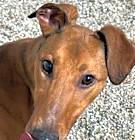Salukis can feature various coat colors. Common colors include white, fawn, reddish-brown, and black and tan. The fawn coloration is the most common and ranges from a light peach to deeper gold. Less common colors include grizzle and tan, which mixes gray with tan, blue, a muted grayish-blue, and brindle, a striped pattern of dark and light colors.
Saluki
Breed Type: Hound
Common nicknames: Gazelle Hound, Persian Greyhound
Coat: Smooth
Hypoallergenic: No, they will likely trigger allergies.
Temperament: Gentle, quiet, loving, loyal
Life expectancy: 10-17 years
Color & patterns:

Salukis are known for their independent natures, slender builds, and flowing locks. They also are capable of incredible speed and endurance, making them exceptional athletes and sighthounds. They have gentle and affectionate natures and form strong bonds with their families. If you’re seeking a loyal and glamorous companion with a love for running and a touch of elegance, the Saluki is the perfect choice.
Saluki characteristics
Learn about about Saluki basics like their fur colors, shedding levels, how much grooming they need, and other Saluki facts.
Average height
23-28 inches (58.4-71.1cm)
Average weight
40-67 pounds (18.1-30.4 kg)
Average lifespan
10-17 years
Exercise needs
Grooming needs
Full-grown size
Good with cats
Good with kids
Training aptitude
How big do Salukis get?
Salukis are medium to large-sized dogs with a graceful, slender build. Males typically stand between 23 to 28 inches tall at the shoulder and weigh around 40 to 65 pounds. Females are a bit smaller, standing about 20 to 26 inches tall and weighing between 35 to 55 pounds.
Several factors can influence a Saluki’s final size. Genetics play a significant role, with the size of the parents often being a good indicator of the size of their puppies. Nutrition is another important factor; a balanced diet during growth periods can help a Saluki reach their optimal size. Additionally, overall health and early socialization can impact their development.
How much do Salukis shed?
The Saluki is a low-shedding breed, which is great news for those who prefer a lower-maintenance coat. Their coat is smooth and short, with a fine texture that feels sleek to the touch. They have a light-shedding pattern year-round, with slightly more during seasonal changes in the spring and fall.
Grooming a Saluki is relatively straightforward, and helps keep their coat healthy and reduces shedding. A grooming session once a week should suffice to remove loose hairs and keep their coat looking its best.
For brushing, a soft bristle brush works well to remove loose hair and keep the coat smooth. A grooming mitt or a rubber curry brush can also effectively manage shedding and adding shine to their coat. Occasional baths every six weeks or so can help keep their coat clean and healthy.
Saluki temperament
Learn about about the Saluki temperament and how well they fit into your lifestyle, home environment, and family.
Are Salukis good with kids?
Yes, Salukis are often good with children and are beloved for their gentle nature. While they may not be rambunctious or outgoing enough to keep up with some kiddos, they can make wonderful companions for lower-energy and calmer children.
To ensure safe and positive interactions between kids and a Saluki, it’s important to supervise their time together. Teach children how to approach the dog gently, avoiding sudden movements or loud noises that might startle the Saluki. Encourage kids to be respectful of the dog’s space and to handle them gently, especially during activities like petting or playing.
Are Salukis good with cats?
Yes, Salukis can be good with cats because they tend to have a gentle and quiet nature indoors, but since they are sighthounds, they’re best suited to live with cats if they’ve been raised alongside them since an early age. While Salukis can get along with cats, it often requires some extra effort since their instinct to chase can make them particularly interested in smaller animals like cats, so careful introductions and proper training are key.
To ensure a positive relationship, start with gradual introductions. Start with scent-based intros and then keep the Saluki on a leash during initial meetings so you can prevent chasing and reinforce calm and non-fixated behavior with treats. Ensure there are safe spaces where the cat can retreat if they feel threatened or overwhelmed, and make sure you begin introductions at a distance where your Saluki can remain calm.
Do Salukis bark?
Yes, Salukis can bark, but they are rather quiet dogs. They tend to be pretty reserved, and they often only bark in response to specific situations, such as when something unusual happens or during playtime. So, if you’re looking for a dog who’s more of a quiet observer than chatty, the Saluki might be a good fit for you.
However, it’s important to note that these dogs require the ability to run daily and may bark from frustration or restlessness without sufficient physical exercise and enrichment.
Are Salukis good family dogs?
Yes, most Salukis are good family dogs. While they can be quite shy or aloof around strangers, these high-speed pups tend to be loving and loyal to their own family. They do require intense daily activity, so an active family that loves to go jogging or has a house with a fenced-in yard for playing is ideal. Like most sighthounds, Salukis can be prone to dashing off after small animals in the park or on a trail, so it’s best to keep them leashed or ensure they have excellent recall in high-distraction environments.
Are Salukis easy to train?
Yes, Salukis can be easy to train with positive reinforcement and gentle, non-coercive training sessions. While all dogs should be trained with only gentle methods, Salukis are especially sensitive to harsh tones or behaviors from pet parents or trainers. It’s best to either incorporate running into training sessions through games or make sure that your Saluki pal has had the chance to run off pent-up energy before training. Otherwise, they may be a bit distractible. Also, keep in mind that training any dog takes substantial time and effort, regardless of breed.
Can Salukis be off-leash?
Yes, some Salukis can be off-leash in areas that aren’t fenced in, but they need to have a consistent, reliable, and rock-solid recall first. If you’d like to take your Saluki to an unenclosed field for running, it’s imperative to ensure they will come back to you when you call. Since these sighthounds can quickly dash off when they spot a wild animal they’re interested in chasing, it’s best to keep them on leash or in a fenced-in area unless you have specifically worked on recall in a high-distraction environment. This means for most pet parents, keeping your Saluki on leash or in an enclosed environment is the best solution.
Saluki history
Learn about where this Saluki came from!
Are Salukis the fastest dog?
No, Salukis aren’t the fastest dog breed in the world, but they are definitely among the fastest dog breeds. While the number one spot goes to the Greyhound, which can reach speeds of up to 45 miles per hour, Salukis are not far behind — they can hit speeds of around 40 miles per hour.
What really sets Salukis apart is their incredible endurance. While Greyhounds excel in short sprints, Salukis are built for sustained speed over long distances, making them excellent endurance runners. So, while they might not be the fastest in a short dash, they’re unmatched when it comes to maintaining high speeds over longer distances.
Where are Salukis from?
Salukis are one of the oldest dog breeds in the world. They are from ancient Mesopotamia, around the area that’s now modern-day Iraq, Kuwait, and parts of Syria. They were highly prized by the nomadic Bedouin people and were often used for hunting game like gazelles in the harsh desert environments. Today they are beloved as elegant, swift, and endearing companions.
How long do Salukis live?
Salukis can live about 10 to 17 years. Besides genetics, a few key factors can influence how long they live. A healthy diet, daily exercise, and routine vet check-ups are essential for helping them reach those golden years. Providing them with a safe, loving, and enriching environment can also increase their longevity and ensure they live happy lives.
Is a Saluki a rare breed?
Yes, Salukis are a rare breed, especially outside their regions of origin in the Middle East. Although they have a rich history dating back thousands of years, they aren’t as commonly seen as other breeds. This rarity adds to their allure for those who appreciate their unique combination of elegance, speed, and ancient lineage.
Saluki health
Learn about about the Saluki health outlook and what diseases they may be prone to at various stages of their life.
Do Salukis have a lot of health problems?
No, Salukis don’t tend to have a lot of health problems. As one of the most ancient dog breeds, the Saluki is quite healthy and long-lived. Still, there are some genetic health problems they face a risk of developing:
Hip dysplasia: This genetic condition occurs when the hip joint doesn’t fit properly into the socket, leading to discomfort and arthritis over time. It can cause pain and mobility issues, making regular vet check-ups essential for early detection.
Hemangiosarcoma: This serious cancer affects the blood vessels and can develop rapidly, often requiring immediate medical attention. Symptoms can be vague, so monitoring for any unusual signs is crucial.
Hypothyroidism: In this condition, the thyroid gland fails to produce enough hormones, which can lead to weight gain, lethargy, and skin problems. Regular thyroid checks and proper medication can help manage the condition effectively.
Mitral valve disease: This heart condition involves improper functioning of the valve that regulates blood flow within the heart, potentially leading to heart failure if untreated. Symptoms include coughing and difficulty breathing, and prompt treatment is important for managing the disease.
Dilated cardiomyopathy: This condition causes the heart to become enlarged and weakened, impairing its ability to pump blood efficiently. It can lead to heart failure, and early diagnosis and treatment are crucial for maintaining heart health.
Regular vet check-ups and a healthy lifestyle can help manage these risks and keep your Saluki in good shape.
Do Salukis smell?
No, Salukis don’t smell compared to some other breeds that may have a more pungent scent. Their short, sleek coat tends to stay relatively clean and dry, which helps minimize any potential smells. Weekly grooming and occasional baths can help keep them smelling fresh, but overall, Salukis have minimal odor.
Are Salukis hypoallergenic?
No, Salukis are not hypoallergenic. While they do shed less than some other breeds and have a short, fine coat that doesn’t hold onto dirt and dander as much, they still produce a standard amount of allergens from their dander and saliva. If someone in your household has allergies, it’s best to spend time with a Saluki first to see how they react before bringing one home.
Popular Saluki mixes
Saluki mixed-breed dogs are unique companions who are as versatile as they are beautiful. Here are some popular combinations:
Saluki Poodle (Saluki + Poodle)
Saluki Greyhound (Saluki + Greyhound)
Afghan Saluki (Saluki + Afghan Hound)
Saluki Whippet (Saluki + Whippet)

Find Saluki puppies near you
Adopting a Saluki
We don't see any Salukis available for adoption in your exact location or cities near you, but here are some adorable similar breeds in Columbus, OH.

Pudge
Greyhound Hound (Unknown Type)
Female, 3 yrs 7 mos
Westerville, OH
Not good with dogs
Not good with cats
Spayed or Neutered
Shots are up-to-date

Woody
Greyhound Hound (Unknown Type)
Male, adult
Westerville, OH
Good with dogs
Not good with cats
Spayed or Neutered
Shots are up-to-date

Reacher
Greyhound Hound (Unknown Type)
Male, 3 yrs 6 mos
Westerville, OH
Good with dogs
Not good with cats
Spayed or Neutered
Shots are up-to-date

Pepper Jack
Greyhound Coonhound (Unknown Type)
Male, 2 yrs 6 mos
Westerville, OH
Good with dogs
Not good with cats
House-trained
Spayed or Neutered
Shots are up-to-date

Peter
Greyhound
Male, young
New Albany, OH
Not good with dogs
Not good with cats

Meg
Greyhound
Female, young
New Albany, OH
Not good with dogs
Not good with cats

Pudge
Greyhound Hound (Unknown Type)
Female, 3 yrs 7 mos
Westerville, OH
Not good with dogs
Not good with cats
Spayed or Neutered
Shots are up-to-date

Woody
Greyhound Hound (Unknown Type)
Male, adult
Westerville, OH
Good with dogs
Not good with cats
Spayed or Neutered
Shots are up-to-date

Reacher
Greyhound Hound (Unknown Type)
Male, 3 yrs 6 mos
Westerville, OH
Good with dogs
Not good with cats
Spayed or Neutered
Shots are up-to-date

Pepper Jack
Greyhound Coonhound (Unknown Type)
Male, 2 yrs 6 mos
Westerville, OH
Good with dogs
Not good with cats
House-trained
Spayed or Neutered
Shots are up-to-date

Peter
Greyhound
Male, young
New Albany, OH
Not good with dogs
Not good with cats

Meg
Greyhound
Female, young
New Albany, OH
Not good with dogs
Not good with cats





